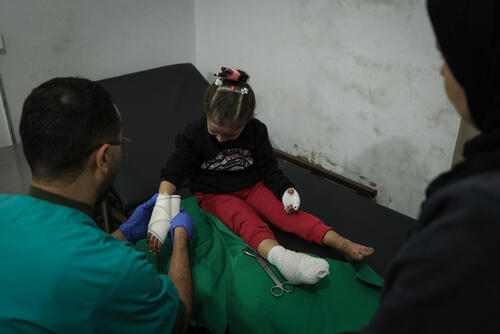Médecins Sans Frontières (MSF) has exposed the violence that continues to be perpetrated on children and young people by European Union Member State border authorities and police on Serbia’s borders with Hungary, Bulgaria and Croatia in a new report titled Games of Violence.
The report uses medical and mental health data and the testimonies of our young patients in detailing the violence.
“For the children and young people trying to leave Serbia today, violence is a constant and the overwhelming majority is perpetrated by EU Member State border police,” said Stephane Moissaing, MSF’s Head of Mission in Serbia. “For more than a year our doctors and nurses have continued to hear the same, repetitive story of young people being beaten, humiliated, and attacked with dogs for desperately trying to continue their journeys.”
In the first six months of 2017, 92 per cent of children and teenagers attending MSF mental health clinics and reporting physical violence mentioned EU Member State police or border authorities – namely Bulgaria, Hungary and Croatia – as the perpetrators. Almost half these children (48%) singled out Bulgarian authorities. From January to June 2017, MSF medical teams working in mobile clinics in Belgrade documented 62 incidents of intentional violence at the Hungarian border and 24 on the Croatian border. The vast majority of these accounts followed the same pattern of beatings, dog bites and the use of irritant spray that MSF teams have heard about for the past two years of seemingly systematic violence against people trying to cross into the European Union.
“It’s disgraceful that EU Member States are intentionally using violence to deter children and young people from seeking asylum in the European Union”, says Moissaing. “It’s not stopping these kids from trying but it is causing serious damage, both physical and psychological, making them more vulnerable and pushing them back into the hands of the smugglers the European Union and the Member States claims to be fighting.”
MSF has been working with refugees, asylum seekers, and migrants in Serbia since late 2014 and providing medical and mental health care, shelter and water and sanitation at the entry and exit points of the country. Since January 2016 MSF has been working in Serbia’s capital Belgrade to provide primary health and mental health care to those stranded in informal settlements in the city. In 2017 MSF opened a fixed clinic in the city centre and continues to advocate for access to health care, shelter and protection for the vulnerable population of men, women and children stranded in Serbia.





